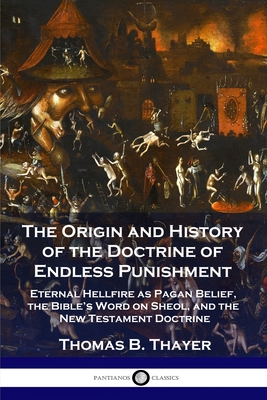The Origin and History of the Doctrine of Endless Punishment: Eternal Hellfire as Pagan Belief, the Bible's Word on Sheol, and the New Testament Doctr

The Origin and History of the Doctrine of Endless Punishment: Eternal Hellfire as Pagan Belief, the Bible's Word on Sheol, and the New Testament Doctr
Thomas B. Thayer investigates eternal hellfire as a punishment for deceased sinners, contrasting this idea to what actual, Biblical passages say about Sheol (Hell) in the Old and New Testaments.
The popular notion that hell is a permanent residence for those who have committed wrongdoing has no Biblical grounding. Rather, it is a combination of embellishment of existing scriptural passages, and sheer invention. Nevertheless the stark vividness of hellish imagery - of blazing hellfire and unceasing torture for all eternity - was powerful. It became a popular topic for preachers seeking to frighten their audiences, while certain leaders used it as a justification for mass murder of heretics and non-believers.
Thayer examines the Bible's allusions to Sheol, through the Old Testament and the New. We learn that Moses, in bringing down the Ten Commandments, never alluded to Hell as a fiery deterrent to wrongdoers. While scriptural passages allude to Sheol's existence, there is no description that matches the popular idea of hellfire - the idea is of Pagan origin, with polytheistic religions of Egypt, Greece and Rome the primary influence. Supporting this argument are images and stories of these ancient religions, which the author details.
Educated at Harvard, Thomas B. Thayer was a well-regarded Bible scholar in the 19th century, who taught theology for decades.
PRP: 99.03 Lei
Acesta este Prețul Recomandat de Producător. Prețul de vânzare al produsului este afișat mai jos.
89.13Lei
89.13Lei
99.03 LeiLivrare in 2-4 saptamani
Descrierea produsului
Thomas B. Thayer investigates eternal hellfire as a punishment for deceased sinners, contrasting this idea to what actual, Biblical passages say about Sheol (Hell) in the Old and New Testaments.
The popular notion that hell is a permanent residence for those who have committed wrongdoing has no Biblical grounding. Rather, it is a combination of embellishment of existing scriptural passages, and sheer invention. Nevertheless the stark vividness of hellish imagery - of blazing hellfire and unceasing torture for all eternity - was powerful. It became a popular topic for preachers seeking to frighten their audiences, while certain leaders used it as a justification for mass murder of heretics and non-believers.
Thayer examines the Bible's allusions to Sheol, through the Old Testament and the New. We learn that Moses, in bringing down the Ten Commandments, never alluded to Hell as a fiery deterrent to wrongdoers. While scriptural passages allude to Sheol's existence, there is no description that matches the popular idea of hellfire - the idea is of Pagan origin, with polytheistic religions of Egypt, Greece and Rome the primary influence. Supporting this argument are images and stories of these ancient religions, which the author details.
Educated at Harvard, Thomas B. Thayer was a well-regarded Bible scholar in the 19th century, who taught theology for decades.
Detaliile produsului










